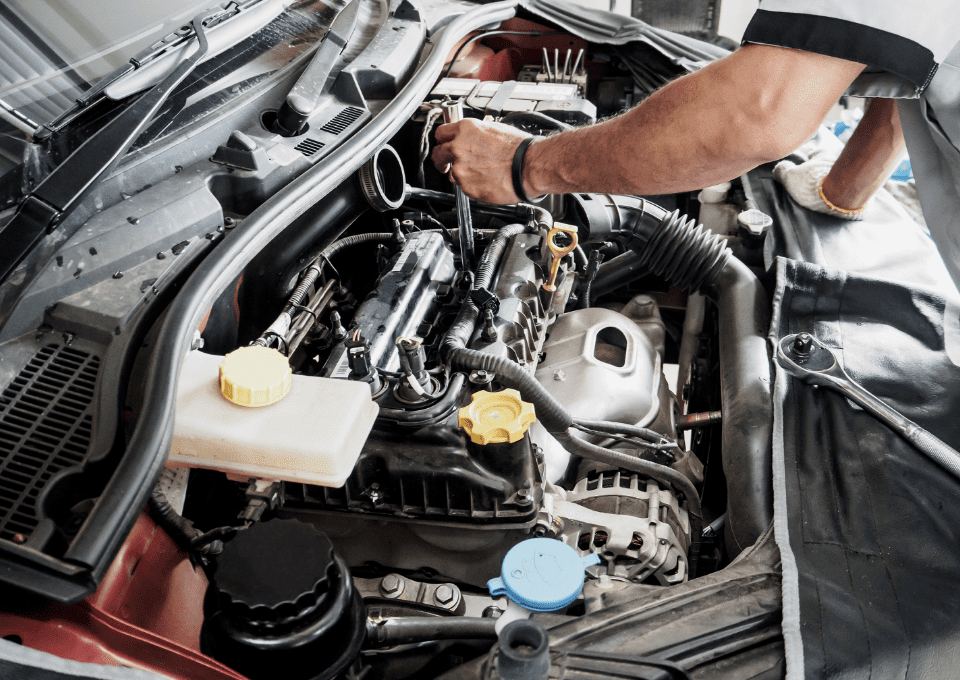
Our services.
-

Air Conditioning Repair
Heating and A/C should be checked seasonally to keep your car comfortable.
-

Air Filters
Air filters should be changed nearly every 3,000 – 15,000 miles, or perhaps with your oil change.
-

Batteries
Batteries should be examined and sustained to guarantee the performance of your automobile’s electric system.
-

Belts and Hoses
Belts may wear and break over time. A belt that becomes worn may slip or also become so slack that it may not function correctly. Hoses may glaze and split after long years of use or when exposed to harsh temperatures. A damaged hose pipe may lead to vital fluids dripping from your engine and may create damage to engine parts. To prevent some of the most usual causes of breakdown, see to it your belts and hoses are checked at routine intervals.
-

Brake Repair
Automotive Brakes should be examined at least once a year for the safety of your car. Preserving your car’s brakes is among the most vital measures you can take. You can have the confidence of knowing that when you press your foot to the brake, your car is coming to a stop.
-

Cooling System Repair
Cooling Systems reduce heat to help all other engine parts function properly.
-

Differential Repair
Rear and front differential service is usually done at higher mileage intervals than a more routine service like an oil change. Check differential fluid levels every 30,000 miles and get a differential fluid change whenever the owner’s manual suggests.
Different vehicles use various fluid types, so the change intervals will vary by manufacturer. When to change differential fluid also depends on how you drive. A truck that hauls heavy cargo every day will need a rear differential fluid service much sooner than a weekend driven sports car.
-

Driveline Repair
The driveshaft is the tube that transfers power from the transmission to the rear differential. Connected on each end by U-joints, the driveshaft transfers the torque and rotation of the engine into vehicle motion.
-

Engine Diagnostics
Today’s vehicles are equipped with highly sophisticated electronic engine control systems. The computer receives information from a network of sensors and switches that tells your ignition, fuel and emission control systems what to do. At the first sign of any engine problems, such as rough running, low fuel economy, failure to pass an emissions test or dashboard warning lights, be sure to get service as soon as possible.
-

Fluid Inspections
Fluids need to be examined and changed at normal intervals, most fluids are examined and filled during regular oil changes.
-

Four Wheel Drive System
Your vehicle will still move even if the service 4WD light is on. However, it could lead to transmission issues and damage to the all-wheel drive system. In any case, it’s best to make an appointment as soon as possible to diagnose any possible issues.
-

Oil Changes
Oil and filters need to be changed every 3,000 to 5,000 miles.
-

Preventative Maintenance
Bringing your vehicle to us for regular service is the best way for you to save money and avoid mechanical problems.
-

Suspension Repair
Properly aligned steering and suspension can help deliver a smooth and controlled ride.
-

Tire Services
Services include tire rotations, tire balancing, tire installation and tire repair!
-

Transmission Fluid Flush/Service
It pays to take care of your car’s transmission. Literally. When the transmission performs optimally, your fuel economy is improved, transmission trouble can turn into expensive repairs So, it’s wise to give your transmission consistent, routine attention.
-

Tune-ups
Tune-ups can extend the life of your vehicle and decrease the need to replace engine parts that are vulnerable to wear and tear.
